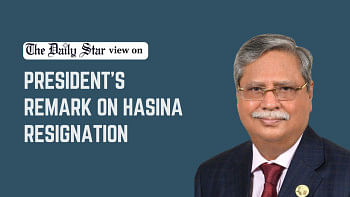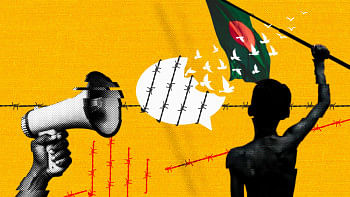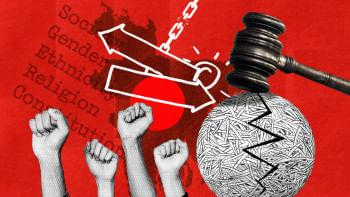How misinformation threatens our democracy

Democracy relies on the principles of informed citizen participation, transparency, and accountability. However, in Bangladesh, the democratic process faces significant challenges, with one key issue being the pervasive spread of misinformation and the powerful influence of online platforms.
In recent years, internet usage and social media penetration have surged in Bangladesh. While this has facilitated the exchange of information, it has also become a breeding ground for misinformation, fake news, rumours, and deliberate propaganda. As the country becomes increasingly digitised, the impact of misinformation on public opinion and political decision-making is more pronounced than ever.
In some cases, mainstream media has also played a problematic role in spreading misinformation. Sensationalised headlines or misleading titles often contribute to the spread of false information—media outlets, driven by competition for attention and viewership, sometimes prioritise sensationalism over fact-based reporting. This practice not only misinforms the public but also deepens confusion on critical issues.
Misinformation spreads quickly in these environments, creating confusion and leading to misguided decisions based on false premises. This issue becomes particularly acute during times of political tension and unrest. Political parties and vested interest groups often use social media to spread rumours and misinform the public in an attempt to influence political preferences. These falsehoods are often crafted to appear credible, making it difficult for the average citizen to discern fact from fiction.
A notable example is the rise in communal violence fuelled by rumours spread on social media. Recently, there have been several incidents where religiously sensitive issues were blown out of proportion by online misinformation, leading to mob violence and even deaths. This highlights the dangerous role both online misinformation and misleading mainstream media can play in destabilising society and undermining democratic processes.
During electoral campaigns and political events, the spread of misinformation intensifies as various political factions seek to sway public opinion in their favour. This includes rumours, fake news stories, and manipulated images or videos—or even misleading media headlines.
While the internet has opened avenues for greater political engagement and discourse, it has also led to the proliferation of echo chambers—online spaces where individuals are primarily exposed to information that reinforces their existing beliefs. These echo chambers distort public perceptions of political issues, contributing to polarisation and undermining democratic deliberation.
Moreover, social media algorithms exacerbate this problem. Users are often fed content that aligns with their previous interactions, perpetuating misinformation and limiting exposure to diverse viewpoints. As a result, individuals may become trapped in a cycle of misinformation, further entrenching their beliefs and reducing the likelihood of meaningful dialogue across political divides.
The consequences of misinformation and online influence on democracy in Bangladesh are profound. First and foremost, they erode public trust in democratic institutions. When citizens are bombarded with conflicting narratives, they become disillusioned with the political process and are less likely to engage in civic activities. This disengagement diminishes the overall health of democracy.
Furthermore, the manipulation of public opinion through misinformation can have serious implications for policy-making. When policymakers rely on distorted data and public perceptions shaped by misinformation, they may make decisions that do not reflect the actual needs and interests of the population. This misalignment can hinder effective governance and stall progress on critical issues facing the country.
To address the challenges posed by misinformation and online influence, Bangladesh must take a multi-faceted approach. First, enhancing media literacy among the population is essential. Educating citizens on how to critically evaluate information sources, discern facts from falsehoods, and engage constructively with diverse viewpoints can empower them to navigate the complex online landscape.
Traditional media houses also have a critical role to play. As established sources of news, they have a responsibility to ensure their reporting is fact-based, transparent, and free of sensationalism. By adopting ethical journalism practices, verifying sources, and avoiding misleading headlines, they can set a standard for the responsible dissemination of information. Media houses should collaborate with fact-checking organisations and other institutions to counter the spread of misinformation, both online and through their platforms.
Additionally, social media companies and the government must collaborate to develop robust mechanisms for identifying and addressing misinformation. This includes implementing fact-checking initiatives, promoting transparency in content moderation, and creating awareness campaigns to inform users about the dangers of misinformation.
Finally, fostering an open political culture that encourages constructive debate and dialogue is crucial. When citizens feel free to express their views and engage in political discussions, they are less likely to be swayed by misinformation. A well-informed electorate is essential for the success of democracy, and this can only be achieved through collaborative efforts to combat misinformation and promote civic engagement.
Debbrata Kumar Adhikary is a development practitioner.
Views expressed in this article are the author's own.
Follow The Daily Star Opinion on Facebook for the latest opinions, commentaries and analyses by experts and professionals. To contribute your article or letter to The Daily Star Opinion, see our guidelines for submission.

 For all latest news, follow The Daily Star's Google News channel.
For all latest news, follow The Daily Star's Google News channel. 







Comments